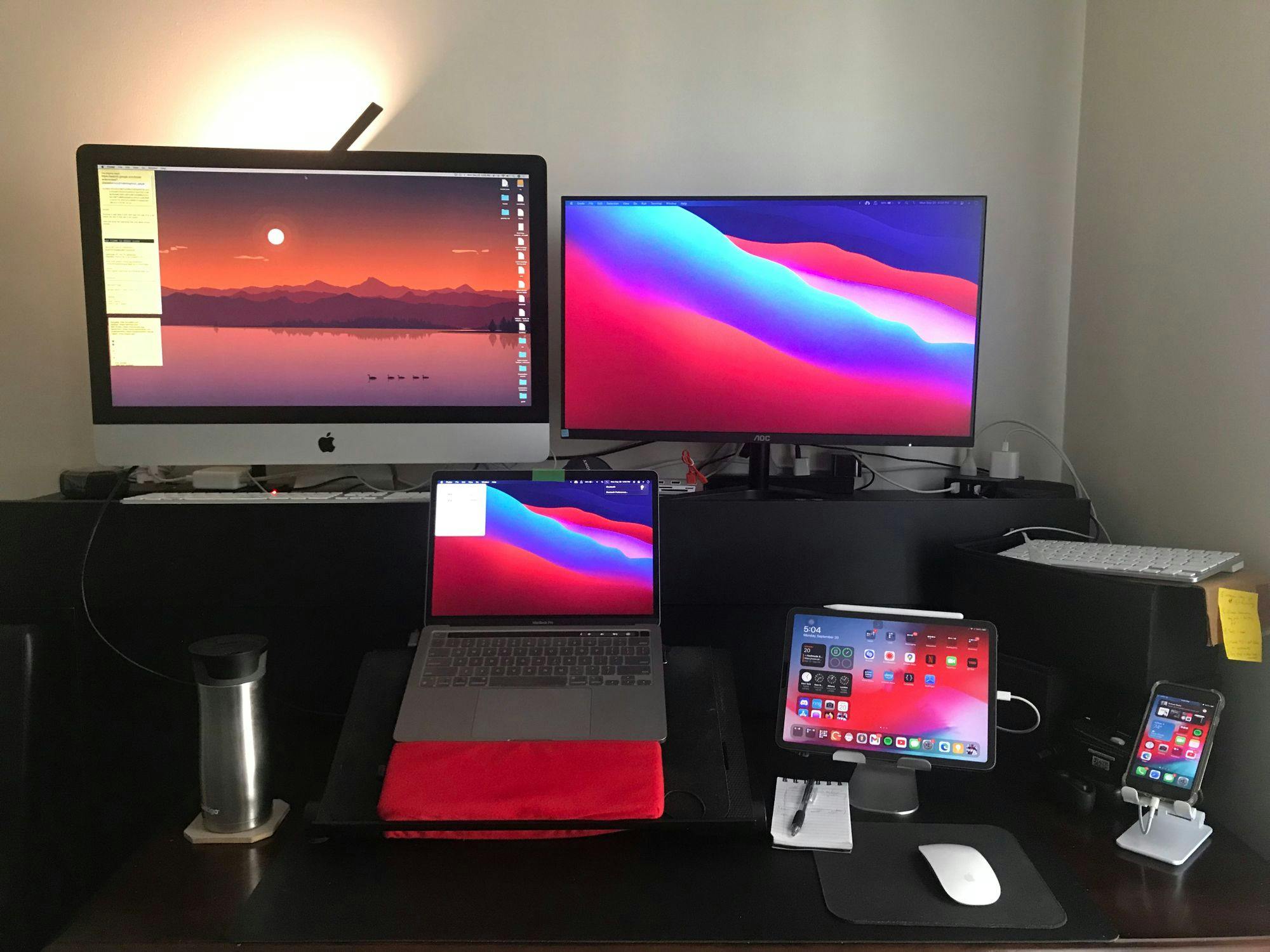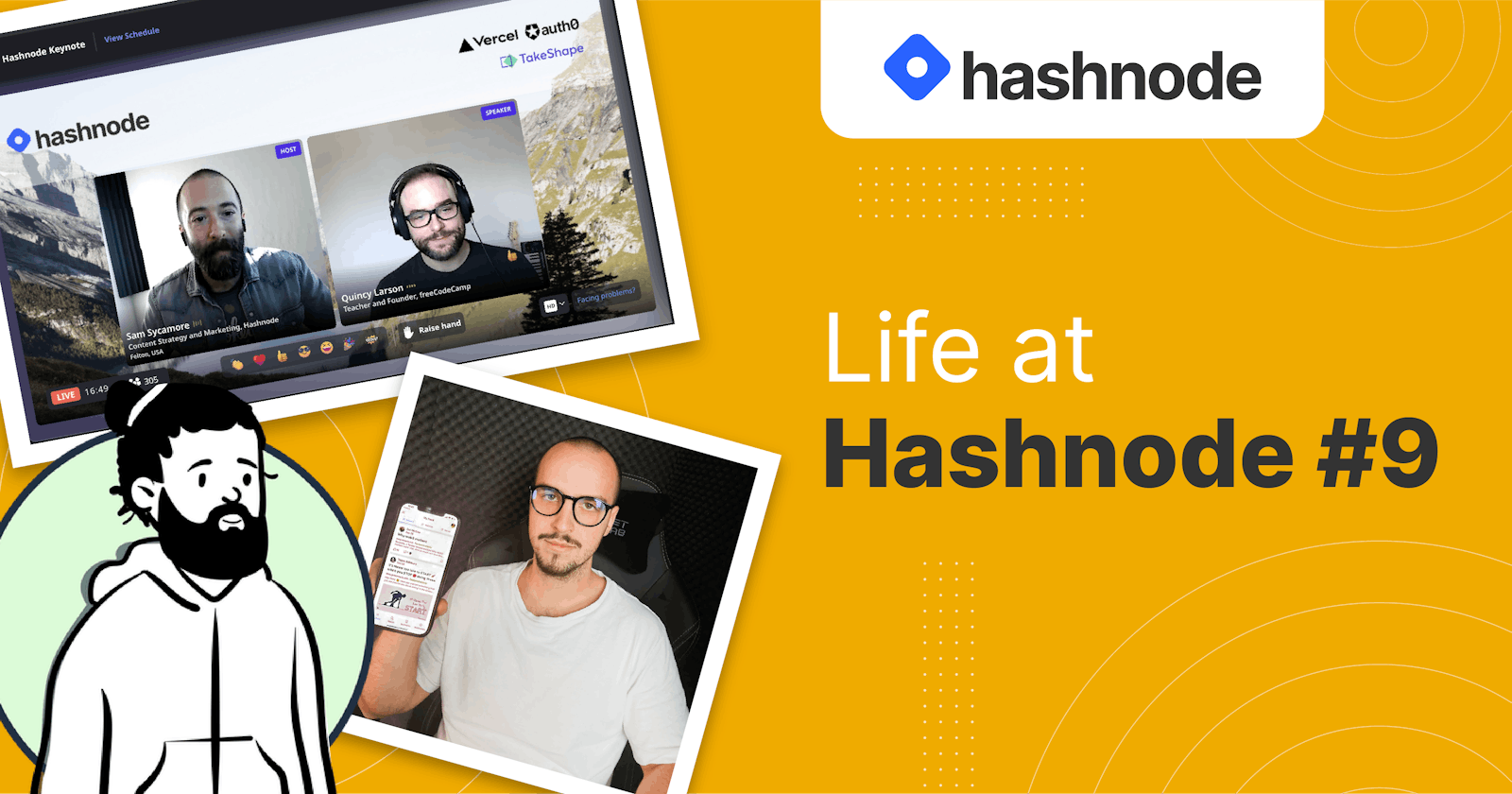Life at Hashnode #9: Adapting to a Fully Async Workflow with Gaurang
Megha Pathak interviews our senior developer Gaurang about his career, and what it's like to work on the cutting edge of fully remote startups.
You wouldn't believe me if I told you how much has changed since the last installment of Life at Hashnode!
Over the span of just a few short weeks, we launched a shiny new mobile app and hosted two major events: our Technical Writing Bootcamp and the Open Source Symposium.
It's a real pleasure for us to bring these initiatives to our community, but they're only a success because you all continue to show up and support us. And we can't thank you enough for that!
As our global team continues to grow, we're experimenting with new ways of collaborating and organizing our work asynchronously. It's a fun challenge, and we all really enjoy being on the cutting edge of fully-remote tech startups.
One of the most recent additions to the Hashnode crew is our new senior developer Gaurang. He won't sing his own praises in the interview that follows, but all of his dev teammates certainly would. 😊 Stick around to the end to find out Gaurang's advice for those of you who hope to become senior devs at a company like Hashnode one day!
Introducing Gaurang ✨✨
Can you quickly introduce yourself?
Sure thing, I'm Gaurang, I usually describe myself as a lover of life, music, and code (in that order). I recently joined Hashnode after many years of working as a freelancer. I am extremely enthusiastic about Hashnode, our mission, and the brilliant people that I get to work with.
You can find me Twitter and on my blog.
What has your journey been like on the way to Hashnode?
It has definitely been a journey, that's for sure. Over the years I've been fortunate enough to wear many hats in various capacities working with organizations large and small as a freelancer. Interestingly enough I started on this journey as a designer and had the pleasure of learning along the way as I transitioned into a brand strategist then consultant and for the past 5 years I've been primarily focused on the development side of the coin.
How'd you begin coding in the first place?
I've been dabbling with programming for years. Early on in my career I relied heavily on no-code tools, but along the way I'd run across challenges that were just too complicated for those tools. I eventually reached a point where I was just jumping through too many hoops to make those tools do what I needed them to, that it just "seemed" easier to learn programming.
I will say that learning to code seems to be a perpetual journey, things change so fast with technology that you're always learning something new and I find that both challenging and intriguing.
What have you learned in the process of adapting to Hashnode's async workflow? How do you manage your time?
I think it's always a challenge when your teammates are in different timezones. I believe there are only two of us in the U.S. and the rest of the team is located throughout India and various parts of Europe. So, I find myself being very mindful of when I can get in contact with fellow teammates. I also think it forces me to deep dive early with each task to try and foresee any questions or roadblocks I may run into, so they can be addressed accordingly and not hinder our progress (this one's still very much a work in progress).
As far as managing my time goes, I'm a bit of a creature of habit. I literally wake up at the same time everyday and haven't relied on a daily alarm in almost a decade. I will admit that although my schedule can be fluid, it does give me a good work/life balance. My goal is to add more personal reading and activity time. (I can be a bit of a workaholic... 💁♂️)
What does a typical work day look like for you?
I wake up at 8am, and will usually squeeze in a short meditation session right before breakfast. During breakfast I'll usually check emails and tackle anything I can quickly take care of. I'll also reach out to any teammates if I need their input on something before they leave for the day.
I generally leave myself a small todo list from the prior day of any leftover tasks. I'll usually review list and prioritize each item. Once i have a clear picture of the day I get to work. I'll usually work for about 3 hours straight and try to address all of my leftover tasks before lunch. We typically have all of our meals together as a family, especially since we've all been working remotely because of the pandemic and to be honest I quite enjoy it.
I'll usually be back at my desk within 30 mins and I'll work straight through until dinner. After dinner I like to either do some research if there's anything I'm trying to figure out (which there usually is) or just read. Then at about 9pm I get back to my desk and like to do some house keeping - reconciling tasks, reviewing and updating notes, etc - before I get back to coding. I'll usually work through till about 1am sometimes later (if there's a lot going on). Currently, I'm using this time to explore and get familiar with the Hashnode codebase. Generally, I usually get my best work done at this time.
What's the most exciting thing you are working on currently at Hashnode?
I'm really excited about the expanded analytics that we'll soon be adding to our user's dashboard. We currently provide some basic analytics, but we're working on an in-house solution that will give users better insights into how their content performs on the Hashnode platform. I think this can be something that really separates us from other platforms and gives users unprecedented insights into their blog’s performance — so that is very exciting.
What are the biggest challenges of your job?
If I am being honest it would be the apparent time it is going to take me to get familiar with such a complex codebase. Imposter syndrome tends to kick-in in these situations especially when you're trying to wrap your head around the various services and micro-services that are used to make Hashnode as performant and usable as it is.
I really find it challenging because I want to add value to the team's efforts, but as it stands right now each solution leads to two more questions, and I keep pulling on them like threads to see where they lead and I keep reminding myself that it's going to take time.
What was the one thing that made you decide to work for Hashnode?
I think the fact that I love to use Hashnode and find it to be vital resource for developers — that played a huge role. Although, I think there was something about my early interactions with our management team in my interviews that sealed the deal for me. They made me feel valued from the first moment and in every interaction since. In fact, when I think about it the whole experience seems a quite serendipitous to me.
What do you think makes Hashnode's team different from other startups out there?
I think it's the people, everyone is extremely helpful, graciously taking time out of their own day to bring me up to speed and fielding my naive questions along the way. I think this helps to create an open atmosphere that is conducive to productivity.
What do you enjoy the most about your role?
It’s quite early in my Hashnode journey, but after working solo for the better part of my career, being able to rely on others is very new to me. And to my surprise, I think this is the part that I enjoy the most. Having people to bounce ideas and decisions off of really feels like a breath of fresh air. For once in my career, everything is not dependent on me, and I quite enjoy that.
Can we get a peek at your workstation?

What's the one piece of advice you'd give to someone exploring a role as a senior developer at Hashnode or some other company?
I think anyone exploring roles at Hashnode or any other startup could benefit from immensely from contributing to other projects. If there’s one thing I would’ve done differently, it would be to have contributed to more open source projects. I think this would’ve given me more experience working with other people’s code and that is a skill that is only learned through experience.
So I think my best advice would be to contribute to projects that you enjoy using, there’s a lot to learn there and it’s a great place to start building your chops as a senior developer.
That's all for today folks!
Thank you for catching up with this edition of Life at Hashnode, I will see you in the next one.

